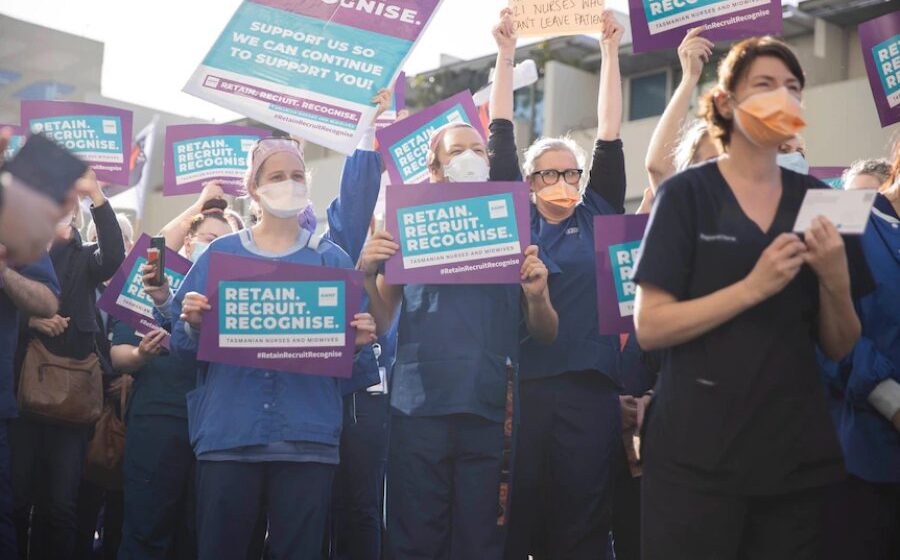An exhausted workforce, staffing levels below safe minimums and nurses feeling like they are unable to give patients the care they need: This is the picture nurses have painted of the Royal Hobart Hospital (RHH).
Hundreds of nurses held a 15-minute strike outside the RHH on Wednesday, calling for immediate action from the state government.
“On a regular basis throughout this hospital, you’ll have nurses who will start work at 2 o’clock in the afternoon, they’ll get asked to stay on for the night shift, and they’ll go without a break, working fatigued, right through to 8 o’clock the next morning,” RHH registered nurse Monica Werner said.
“I’d hope that the government and the THS [Tasmanian Health Service] will not dismiss what we’ve been saying.
“We’re sick and tired of listening to patronising and offensive declarations of appreciation when they mean nothing,” Ms Werner said.
“We hope to get safe staffing. We want to recognise our nurses with decent pay, comparable to the rest of the country, and we want to see safe staffing, which means ratios.”
Australian Nursing and Midwifery Federation (ANMF) Tasmanian branch secretary Emily Shepherd said members had been “extremely patient over the two years of a COVID-19 pandemic, working at 200 per cent with inadequate resources”.
“Enough is enough,” Ms Shepherd said.
She said staffing levels at the Royal Hobart Hospital were “having an adverse impact on patient care” and it was a problem that needed “an immediate solution”
‘We’re all tired’
Several nurses spoke about doing their best in difficult circumstances.
“It’s pretty hard. Every single shift I work is short-staffed,” Emily Perkins said.
“There’s not enough of us … I came into nursing to care for people and I feel like I can’t do that properly.”
“We’re all tired,” her colleague, Emma Desmond, said.
In the hospital’s intensive care unit, there are patient-to-nurse ratios, but nurse Daniel May said there were people working double shifts on almost every night shift.
“I don’t think anyone that comes into the hospital, or [who] has family members in the hospital, would want someone that’s been there for 18 hours looking after their family member,” Mr May said.
He said the situation was much worse for his colleagues working in the hospital’s emergency department.
“I don’t think people would believe what it’s like down there unless they went and saw it,” he said.
Nurses have also written letters to Premier and Health Minister Jeremy Rockliff, which have been published by the ANMF. Their comments included:
“I am actively seeking work elsewhere because the thought of going to work gives me anxiety, lack of sleep and stress that is just not sustainable.”
“The number of new and younger nurses I find in tears due to overwhelming work conditions is not fair.”
“I know I could do better for my patients, but the dire staffing levels make it almost impossible to provide even basic care.”
“The chronic shortage of midwives in Tasmania is having a massive impact on our staff and the women of Southern Tasmania. We have not had a fully staffed roster for years and cannot retain interstate graduates due to the cost of living.”
Premier acknowledges ‘very trying circumstances’
Mr Rockliff said he admired and respected the work that Tasmania’s nurses do.
“This is … a time in our health system where we’ve got increasing demand anyway, overlaying the COVID pressures,” Mr Rockliff said.
“I acknowledge that these are very trying circumstances in our hospital environment at the moment. We’re not unique to that as a state.”
Mr Rockliff said he did “not need strike action to hear the voice of nurses”.
“We’re willing to sit down, negotiate in good faith, bring forward negotiations and talk about the next [enterprise] agreement … we want to work at alleviating the pressures.”
Ms Shepherd said bringing forward negotiations was not the answer — she said nurses were asking for conditions they were already entitled to under the current agreement.
“We don’t want to sit down to negotiations and negotiate existing entitlements that need to be met,” she said.
“There’s an obligation on the Tasmanian government to meet those entitlements — safe staffing, ensuring that there are safe workloads, ensuring our members aren’t working onerous amounts of double shifts and overtime — that is already an entitlement in the existing agreement.
“We want the government to step up and meet their obligation.”
Ms Shepherd said the union took the dispute to the Tasmanian Industrial Commission in January, but little progress had been made.
“We’re hoping the government will come to the table with concrete solutions we can put back to members and, potentially, call off our strike action.
“If not, then our members have resolved, here at the Royal Hobart Hospital, to escalate their strike action, and that might mean striking for longer than 15 minutes, and it will also include the ANMF considering arbitration on the issues before the Tasmanian Industrial Commission.”
A similar strike is planned at the Launceston General Hospital next week, and there are also plans for one in the north-west.



